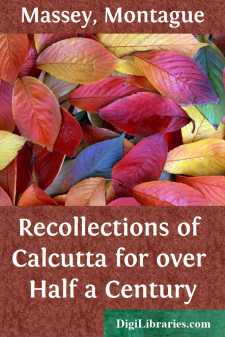Categories
- Antiques & Collectibles 13
- Architecture 36
- Art 48
- Bibles 22
- Biography & Autobiography 813
- Body, Mind & Spirit 142
- Business & Economics 28
- Children's Books 17
- Children's Fiction 14
- Computers 4
- Cooking 94
- Crafts & Hobbies 4
- Drama 346
- Education 46
- Family & Relationships 57
- Fiction 11829
- Games 19
- Gardening 17
- Health & Fitness 34
- History 1377
- House & Home 1
- Humor 147
- Juvenile Fiction 1873
- Juvenile Nonfiction 202
- Language Arts & Disciplines 88
- Law 16
- Literary Collections 686
- Literary Criticism 179
- Mathematics 13
- Medical 41
- Music 40
- Nature 179
- Non-Classifiable 1768
- Performing Arts 7
- Periodicals 1453
- Philosophy 64
- Photography 2
- Poetry 896
- Political Science 203
- Psychology 42
- Reference 154
- Religion 513
- Science 126
- Self-Help 84
- Social Science 81
- Sports & Recreation 34
- Study Aids 3
- Technology & Engineering 59
- Transportation 23
- Travel 463
- True Crime 29
Recollections of Calcutta for over Half a Century
by: Montague Massey
Description:
Excerpt
PART I
Personal.
When I first came to Calcutta things were entirely different to the present day. There was, of course, a very much smaller European population, and every one was consequently pretty well known to every one else, but at the same time the cleavage between the different sections of society was much more marked than it is now. Members of the Civil Service were very exclusive, holding themselves much more aloof than the "heaven-born" do to-day; the military formed another distinct set; while the mercantile people, lawyers, barristers, and others not in any government service, had their own particular circle. This marked cleavage did not, however, prevent the different "sets" from having quite a good time, and as I have said, even if they did not mix together very closely and intimately, we all in a way knew each other.
Forty or fifty years ago, Calcutta was not so lively as it is to-day, especially in the cold weather, but there was one thing in those days which we do not see now. I refer to the regal pomp and circumstance which characterised Government House, and all the functions held there. The annual State Ball was an event which was always looked forward to, and it was a ball at which one could comfortably dance, instead of the crush it had become in the decade prior to 1911.
THE "PALKI."
Looking back, one of the first things that strikes me is the change between then and now in the matter of locomotion. In my early days there were no taxi-cabs, trams, nor even fitton-gharries, the only conveyances for those who had not private carriages being palkis and bund-gharries. It would seem strange to-day to see Europeans being carried about the streets in palkis, but half a century or more ago they were by no means despised, especially by the newly-out chokras, whose salary was not at all too high. They had to choose between a palki and a ticca-gharry, which were very much alike in shape, the difference between them being that the one was carried on the shoulders of coolies, and the other drawn by a horse.
The private conveyances of those days were as a rule quite elaborate affairs, and it used to be one of the sights of the evening to go on "the course," which embraced the Strand and the Red Road, to see the richer inhabitants of the city taking their evening drive. Later, however, the haut ton, evidently thinking the Strand was getting too plebeian, confined their evening drive to a place in the stately procession up and down the Red Road, which thus became "the course."
EARLY-MORNING RACING.
That term must not be taken in its modern sense, however. If one spoke about "the course" to-day, it would be understood to mean the racecourse, but in those days it meant the venue of the evening drive, There was then, as now, a racecourse in Calcutta, but, though on the present site, it was, as might be expected, nothing like so elaborate....


